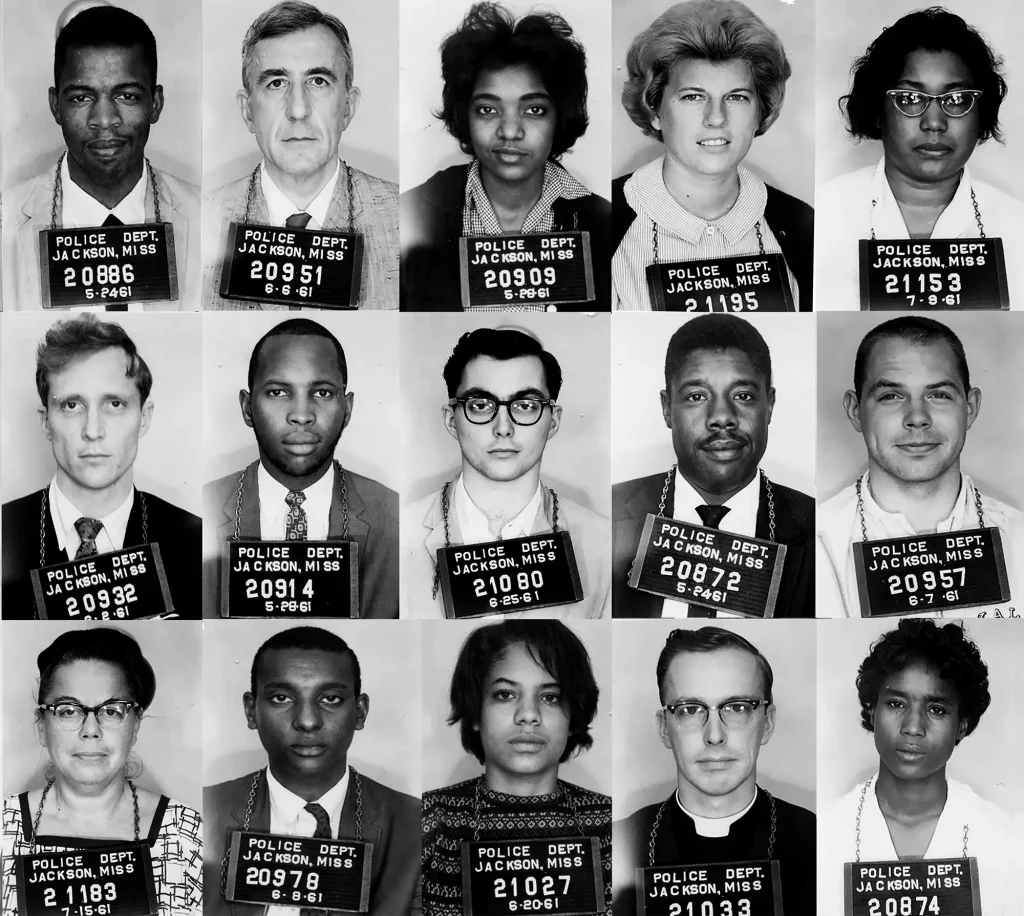Freedom Riders were civil rights activists who rode interstate buses into the segregated Southern United States in 1961 and subsequent years to challenge the non-enforcement of the United States Supreme Court decisions Morgan v. Virginia (1946) and Boynton v. Virginia (1960), which ruled that segregated public buses were unconstitutional. The Southern states had ignored the rulings and the federal government did nothing to enforce them. The first Freedom Ride left Washington, D.C. headed for New Orleans in two buses on May 4, 1961.

Convinced that segregationists in the South would violently protest this exercise of their constitutional right, the Freedom Riders hoped to provoke the federal government into enforcing the Boynton decision. When they stopped along the way, white riders used facilities designated for Blacks and vice versa.
They encountered violence in South Carolina, but in Alabama the reaction was much more severe. On May 14, while stopped outside Anniston to change a slashed tire, one bus was firebombed, and the Freedom Riders were beaten. Arriving in Birmingham, the second bus was similarly attacked, and the passengers were beaten. In both cases law enforcement was suspiciously late in responding. Although the original Riders were unable to find a bus line to carry them farther, a second group of 10, originating in Nashville and partly organized by the Student Nonviolent Coordinating Committee (SNCC), renewed the effort. Undeterred by being arrested in Birmingham and transported back to Tennessee, the new Freedom Riders returned to Birmingham and, at the behest of U.S. Attorney General Robert F. Kennedy, secured a bus and protection from the State Highway Patrol as they traveled to Montgomery, where, when local police failed to protect them, they were again beaten. Thereafter National Guard support was provided when 27 Freedom Riders continued on to Jackson, Mississippi, only to be arrested and jailed. On May 29 Kennedy ordered the Interstate Commerce Commission to enforce even stricter guidelines banning segregation in interstate travel.
Boynton outlawed racial segregation in the restaurants and waiting rooms in terminals serving buses that crossed state lines. Five years prior to the Boynton ruling, the Interstate Commerce Commission (ICC) had issued a ruling in Sarah Keys v. Carolina Coach Company (1955) that had explicitly denounced the Plessy v. Ferguson (1896) doctrine of separate but equal in interstate bus travel, but the ICC failed to enforce its ruling, and Jim Crow travel laws remained in force throughout the South.
The Freedom Riders challenged this status quo by riding interstate buses in the South in mixed racial groups to challenge local laws or customs that enforced segregation in seating. The Freedom Rides, and the violent reactions they provoked, bolstered the credibility of the Civile Rights Movement by calling national attention to the disregard for the federal law and the local violence used to enforce segregation in the southern United States. Police arrested riders for trespassing, unlawful assembly, violating state and local Jim Crow laws, and other alleged offenses, but often they first let white mobs attack them without intervention.

The Congress of Racial Equality (CORE) sponsored most of the Freedom Rides, but some were also organized by the Student Nonviolent Coordinating Committee (SNCC). The original Freedom Riders, led by CORE Director James Farmer, consisted of seven Black, and six whites, and included the late Congressman John Lewis, who was 21 at the time. The Freedom Rides, beginning in 1960, followed dramatic sit-ins against segregated lunch counters conducted by students and youth throughout the South, and boycotts of retail establishments that maintained segregated facilities. Southern local and state police considered the actions of the Freedom Riders to be criminal and arrested them in some locations. In some localities, such as Birmingham, Alabama, the police cooperated with Ku Klux Klan chapters and other white people opposing the actions, and allowed mobs to attack the riders.
Sidebar
The Congress of Racial Equality (CORE) is an interracial American organization established by James Farmer in 1942 to improve race relations and end discriminatory policies through direct-action projects. He founded CORE as a vehicle for the nonviolent approach to combating racial prejudice that was inspired by Indian leader Mahatma Gandhi.




